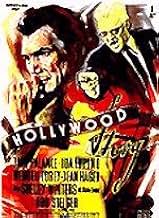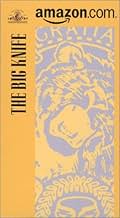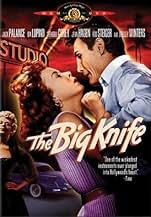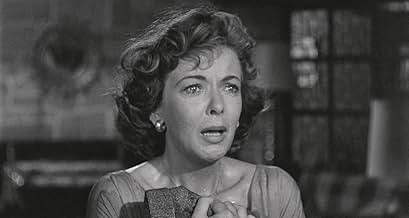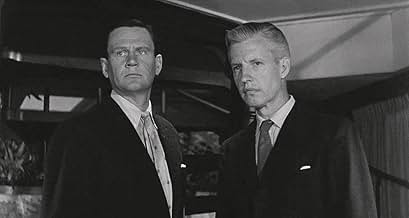CALIFICACIÓN DE IMDb
6.8/10
4.6 k
TU CALIFICACIÓN
Agrega una trama en tu idiomaHollywood actor Charles Castle is pressured by his studio boss into a criminal cover-up to protect his valuable career.Hollywood actor Charles Castle is pressured by his studio boss into a criminal cover-up to protect his valuable career.Hollywood actor Charles Castle is pressured by his studio boss into a criminal cover-up to protect his valuable career.
- Premios
- 1 premio ganado y 2 nominaciones en total
Michael Winkelman
- Billy Castle
- (as Mike Winkelman)
Shelley Winters
- Dixie Evans
- (as Miss Shelley Winters)
Richard Boone
- Narrator
- (voz)
- (sin créditos)
Nick Cravat
- Nick
- (sin créditos)
Robert Emhardt
- Bit Part
- (sin créditos)
Michael Fox
- Prize Fight Announcer
- (sin créditos)
Paula Kyle
- Party Guest
- (sin créditos)
- Dirección
- Guionistas
- Todo el elenco y el equipo
- Producción, taquilla y más en IMDbPro
Opiniones destacadas
A truly memorable film with tough and rugged, but hardly handsome, Jack Palance as Charlie Castle playing of all people an actor who's always playing matinée Idols and great lovers. As Charlie's boss and studio owner Stanley Hoff,Rod Steiger, says of him throughout the film :"He makes all the women of America heart's swoon". "The Big Knife" is worth the price of admission just to see how and if director Robert Aldrich can pull it off and make the film both entertaining and believable.
You see Charlie is getting tired of playing all those roles over the years as a heart throb to the women of America and wants to get out of his contract with the Hoff Studios and go independent; That was a big thing for actors back in the 1950's. Charlie wan't to do films that are worthy of his extraordinary talents as a serious and Shakespearian actor. It's that Charlie's off the wall and possessive boss Stanley Hoff, the Big Knife, doesn't want his meal ticket to leave and take his fans with him! So Stanley rolls out the heavy artillery and plays his trump card. It seems that Charlie has a dark secret that the studio has been covering up for years and if Charlie leaves that secret won't be a secret any more! Get It Charlie!
The film "The Big Knife" can really be described as one of the most multi storied soap operas ever put on film with the audience needing score cards just to keep up with the story and even then they'll get lost. Whoever coined the phrase "Seeing is believing" must have based it on the the incredible performance of Rod Steiger's Stanley Hoff which goes from a Saturday Night Live impersonation shtick of a big Hollywood producer to an Oscar winning interpretation of Hamlet all at the same time! It's really incredible to watch and believe what your seeing in Steiger's over the top performance.
And Jack Palance, determined not to be shown up his co-star, really did pull it off in him Playing a role so out of character and yet evoking real and genuine sympathy from the audience that he should have, but didn't, won the 1955 Academy Award for best actor hands down! As the tortured soul with a dark past who only wanted to do Art Films and get away from playing debonair and charming movie parts that make women go ape all over him. In the end of the film when Palance went all out, or was it underwater, in the final few minutes of the movie he was so convincing that I just couldn't keep the tears from rolling down my cheeks!
No matter how much people criticize Robert Aldrich's "The Big Knife" and with good justification this is one movie where you can really say that the acting actually overwhelmed the script!
You see Charlie is getting tired of playing all those roles over the years as a heart throb to the women of America and wants to get out of his contract with the Hoff Studios and go independent; That was a big thing for actors back in the 1950's. Charlie wan't to do films that are worthy of his extraordinary talents as a serious and Shakespearian actor. It's that Charlie's off the wall and possessive boss Stanley Hoff, the Big Knife, doesn't want his meal ticket to leave and take his fans with him! So Stanley rolls out the heavy artillery and plays his trump card. It seems that Charlie has a dark secret that the studio has been covering up for years and if Charlie leaves that secret won't be a secret any more! Get It Charlie!
The film "The Big Knife" can really be described as one of the most multi storied soap operas ever put on film with the audience needing score cards just to keep up with the story and even then they'll get lost. Whoever coined the phrase "Seeing is believing" must have based it on the the incredible performance of Rod Steiger's Stanley Hoff which goes from a Saturday Night Live impersonation shtick of a big Hollywood producer to an Oscar winning interpretation of Hamlet all at the same time! It's really incredible to watch and believe what your seeing in Steiger's over the top performance.
And Jack Palance, determined not to be shown up his co-star, really did pull it off in him Playing a role so out of character and yet evoking real and genuine sympathy from the audience that he should have, but didn't, won the 1955 Academy Award for best actor hands down! As the tortured soul with a dark past who only wanted to do Art Films and get away from playing debonair and charming movie parts that make women go ape all over him. In the end of the film when Palance went all out, or was it underwater, in the final few minutes of the movie he was so convincing that I just couldn't keep the tears from rolling down my cheeks!
No matter how much people criticize Robert Aldrich's "The Big Knife" and with good justification this is one movie where you can really say that the acting actually overwhelmed the script!
"The Big Knife" caused a sensation when it came out. After all, no one in his right mind would dare to criticize the movie industry, after all, it was the studio and its ruthless executives that were exposed as the bad guys, even at the time where the old studio system was disappearing.
Clifford Odets wrote the original play, which under Robert Aldrich direction doesn't translate to the screen because it feels claustrophobic in many aspects. The movie treatment was by James Poe, did not make the material come alive because of the theatricality of the source.
Charles Castle, an actor working in Hollywood, is about to commit himself to a renewal of his contract to a major studio. That means another seven years of his life working in whatever pictures the higher ups have in store for him. It couldn't come at a worse time; his wife, Marion, who evidently hasn't a good relation with Charles, is fed up with the idea of staying in Bel Air. Marion pleads with him to give up the movie business so they could have a normal life bringing up their young son.
Castle has had his share of adventures in Hollywood, something that Marion is aware of. In addition to that, he has a dark secret, something that involved a terrible accident for which his publicist has taken the blame and has even serve time in jail. A couple of women are also in the picture, threatening Charles' marriage.
To make matters worse, Charles is visited by the head of the studio, Stanley Hoff, who has brought his assistant, the oily Smiley Coy, to help him convince Castle to sign the contract. Charles Castle is finally defeated at the game as Stanley plays his cards right since he has the upper hand. The result is a bitter loss for the actor, who sees no way out of the situation at hand.
Jack Palance, who, up to this film, had only minor parts, rose to the challenge of playing Charles Castle, who in a way, he had the background, having been a boxer, to play. His work, although a bit unsure, was a revelation to the movie going public at the time. Ida Lupino, an excellent actress, is probably the best thing in the picture. Rod Steiger shows up as the studio head Stanley Hoff, a man that knows well his opponent's weaknesses and uses all in his power to get his way. Wendell Corey, in a small part, also does good work. Jean Hagen and Shelley Winters also contribute to the film.
Ernest Lazlo's cinematography works well, as does the musical score by Frank DeVol. Robert Aldrich, a man with a lot of experience in the business, was a natural choice to undertake the direction of this picture. His only problem was a basic one, how to open the play to cinematic terms.
Clifford Odets wrote the original play, which under Robert Aldrich direction doesn't translate to the screen because it feels claustrophobic in many aspects. The movie treatment was by James Poe, did not make the material come alive because of the theatricality of the source.
Charles Castle, an actor working in Hollywood, is about to commit himself to a renewal of his contract to a major studio. That means another seven years of his life working in whatever pictures the higher ups have in store for him. It couldn't come at a worse time; his wife, Marion, who evidently hasn't a good relation with Charles, is fed up with the idea of staying in Bel Air. Marion pleads with him to give up the movie business so they could have a normal life bringing up their young son.
Castle has had his share of adventures in Hollywood, something that Marion is aware of. In addition to that, he has a dark secret, something that involved a terrible accident for which his publicist has taken the blame and has even serve time in jail. A couple of women are also in the picture, threatening Charles' marriage.
To make matters worse, Charles is visited by the head of the studio, Stanley Hoff, who has brought his assistant, the oily Smiley Coy, to help him convince Castle to sign the contract. Charles Castle is finally defeated at the game as Stanley plays his cards right since he has the upper hand. The result is a bitter loss for the actor, who sees no way out of the situation at hand.
Jack Palance, who, up to this film, had only minor parts, rose to the challenge of playing Charles Castle, who in a way, he had the background, having been a boxer, to play. His work, although a bit unsure, was a revelation to the movie going public at the time. Ida Lupino, an excellent actress, is probably the best thing in the picture. Rod Steiger shows up as the studio head Stanley Hoff, a man that knows well his opponent's weaknesses and uses all in his power to get his way. Wendell Corey, in a small part, also does good work. Jean Hagen and Shelley Winters also contribute to the film.
Ernest Lazlo's cinematography works well, as does the musical score by Frank DeVol. Robert Aldrich, a man with a lot of experience in the business, was a natural choice to undertake the direction of this picture. His only problem was a basic one, how to open the play to cinematic terms.
This film is a thinly veiled discussion of various rumors about various big-name actors. Many times over the years, studio heads reportedly paid to bail big stars out of legal jams. And, while you can't prove exactly what happens, people talk and say that the studios paid people off and hid the crimes of its stars. A few examples of the cases which MAY have been covered up would include: Thomas Ince's death aboard William Randolph Hearst's yacht, the death of Jean Harlow's husband, the beating death of Ted Healy (recent stories say Wallace Beery was responsible) and MANY other scandals too numerous to list here. It's like "The Big Knife" is trying to expose these scandals without being too specific--otherwise the filmmakers could have either been sued or blackballed. This film is a lot grittier and cynical than other previous films that look at the dark side of Hollywood (such as "What Price Hollywood?" and "A Star is Born")--and I am pretty sure the studio execs breathed a deep sigh of relief when "The Big Knife" failed at the box office!
"The Big Knife" is not exactly what you'd expect given the film's title or that it's about a killing. You'd think it was an action film, but it isn't. In fact, the film is very non-action--with almost all of the film taking place in a guy's home--and often in just one or two rooms. The only action is when folks TALK about what has already happened or when the ego-centric main character shows his guests an old boxing film he made years earlier.
Jack Palance plays Charles Castle--a famous movie star who has been making a lot of movies which, in his and other people's opinions, are beneath him. He's bored with these sort of films and unhappy about the state of his life. However, his divorce and the crap that the studio forces him into are all his own doing. He cheated on his wife repeatedly and as for the studio, there comes the interesting part of the film. Apparently, years before, Castle was driving drunk and killed someone. But, the studio's 'fixers' came in and got a guy to take the blame--and allowed their money-maker, Castle, to keep on making films. So, when Castle pushes the execs for better films, their ultimate trump card is to expose Castle's guilt in killing someone! He's stuck. At times, the viewer might be inclined to feel a bit sorry for him--but throughout the film he keeps reminding the viewer that down deep, he is a jerk--as are most of the folks in this film. And, just how big an amoral jerk he might be is tested when a fixer (Wendell Corey) has to take care of one more loose end...and wants Castle's help.
For the most part, this is a very good film. Palance and the rest (particularly Corey) are very good. There is one exception, however. While Everett Sloane was a wonderful actor, here he is oddly miscast. Seeing him play an agent and saying 'darling' all the time to Palance just didn't seem believable in the least. They really needed someone oilier--someone who could just drip fake charm--though he WAS very good later in the film during his big scene (at about 90 minutes into the movie). I might have enjoyed seeing someone like, perhaps, Zachary Scott in this part--as he could ooze snake-like charm. Apart from this minor problem, the film delivers--with a resounding indictment on the sleazy dark side of the film industry. It also really helps that the film ended as well as it did--the finale is impressive. Well worth seeing provided you don't mind that the action is all on the cerebral side and not in the great outdoors.
"The Big Knife" is not exactly what you'd expect given the film's title or that it's about a killing. You'd think it was an action film, but it isn't. In fact, the film is very non-action--with almost all of the film taking place in a guy's home--and often in just one or two rooms. The only action is when folks TALK about what has already happened or when the ego-centric main character shows his guests an old boxing film he made years earlier.
Jack Palance plays Charles Castle--a famous movie star who has been making a lot of movies which, in his and other people's opinions, are beneath him. He's bored with these sort of films and unhappy about the state of his life. However, his divorce and the crap that the studio forces him into are all his own doing. He cheated on his wife repeatedly and as for the studio, there comes the interesting part of the film. Apparently, years before, Castle was driving drunk and killed someone. But, the studio's 'fixers' came in and got a guy to take the blame--and allowed their money-maker, Castle, to keep on making films. So, when Castle pushes the execs for better films, their ultimate trump card is to expose Castle's guilt in killing someone! He's stuck. At times, the viewer might be inclined to feel a bit sorry for him--but throughout the film he keeps reminding the viewer that down deep, he is a jerk--as are most of the folks in this film. And, just how big an amoral jerk he might be is tested when a fixer (Wendell Corey) has to take care of one more loose end...and wants Castle's help.
For the most part, this is a very good film. Palance and the rest (particularly Corey) are very good. There is one exception, however. While Everett Sloane was a wonderful actor, here he is oddly miscast. Seeing him play an agent and saying 'darling' all the time to Palance just didn't seem believable in the least. They really needed someone oilier--someone who could just drip fake charm--though he WAS very good later in the film during his big scene (at about 90 minutes into the movie). I might have enjoyed seeing someone like, perhaps, Zachary Scott in this part--as he could ooze snake-like charm. Apart from this minor problem, the film delivers--with a resounding indictment on the sleazy dark side of the film industry. It also really helps that the film ended as well as it did--the finale is impressive. Well worth seeing provided you don't mind that the action is all on the cerebral side and not in the great outdoors.
Bel Air. The well-manicured area of LA where the successful actors, producers and directors in Hollywood live. So says the opening voice- over.
Jack Palance, not the obvious choice for a leading man (& director Robert Aldrich's lame excuse for the film's box office failure) has never been better, nor has he had such a meaty role. His portrayal of pent-up anger and frustration is powerful yet still believable.
He's the washed up star who's unravelling at the seams, wrestling with a dark secret and Rod Steiger, complete with blonde hairdo as his studio manager who is out to keep a lid on bad publicity at all costs. He will stop at nothing at getting a new contract signed.
Ida Lupino is also extremely fine as Charles Castle's (Palance) wife. Their marriage is on the rocks and she pleads that Charles takes the rest that he desperately needs and to not sign. She won't go back to him otherwise. There's good support from tease Shelley Winters and as Charles' agent, Everett Sloane plus Wendell Corey as a ruthless producer.
Much of the action takes place in the Castle's vast living room, nodding to the theatrics of the original play by Clifford Odets.
This is a slow-burning, quite talky, intelligent character-led and well scripted study of Hollywood's mechanics - its layers of people. Not as flashy or melodramatic as some and certainly not as well known, but still directed with surety and skill. Today's viewer will have to adjust to the pace and style but that's easy and the rewards to those attuned can be high.
There's enough depth to the material for a second viewing, which helps bring out the characters even more vividly.
Jack Palance, not the obvious choice for a leading man (& director Robert Aldrich's lame excuse for the film's box office failure) has never been better, nor has he had such a meaty role. His portrayal of pent-up anger and frustration is powerful yet still believable.
He's the washed up star who's unravelling at the seams, wrestling with a dark secret and Rod Steiger, complete with blonde hairdo as his studio manager who is out to keep a lid on bad publicity at all costs. He will stop at nothing at getting a new contract signed.
Ida Lupino is also extremely fine as Charles Castle's (Palance) wife. Their marriage is on the rocks and she pleads that Charles takes the rest that he desperately needs and to not sign. She won't go back to him otherwise. There's good support from tease Shelley Winters and as Charles' agent, Everett Sloane plus Wendell Corey as a ruthless producer.
Much of the action takes place in the Castle's vast living room, nodding to the theatrics of the original play by Clifford Odets.
This is a slow-burning, quite talky, intelligent character-led and well scripted study of Hollywood's mechanics - its layers of people. Not as flashy or melodramatic as some and certainly not as well known, but still directed with surety and skill. Today's viewer will have to adjust to the pace and style but that's easy and the rewards to those attuned can be high.
There's enough depth to the material for a second viewing, which helps bring out the characters even more vividly.
The Big Knife is not for everybody. Some will find it very literate, well-directed and acted(mostly), handling the tense and satire aspects deftly, while others will find it overdone. Both viewpoints are completely understandable, for me there were parts where the film did fall into the latter camp but most of the time it was the former.
As an adaptation of the stage play, which is very compelling and thought-provoking, it is very faithful and translates well adaptation-wise. As a film, it's far from perfect but it comes over well as a film.
There are a few things that don't come off quite as successfully as the rest of the film. Rod Steiger has a very ruthless character, but for my tastes Steiger plays the role too broadly to the point that Hoff felt more of a cartoonish caricature than a real person, to the extent that it came close to hurting the balance of the film and he didn't come over as very threatening. In his performance, there is a lot of camp and scenery-chewing, but not enough of the menace that the role so ruthlessly written needs. The ending does dissolve into contrived melodrama, which is where it is most understandable as to why some will find the film overdone, and felt rushed as well. Lastly, the film does feel over-scored in places, in the places where there is music the blaring music cues felt intrusive.
With the exception of Steiger, the performances are very good. Jack Palance's powerhouse lead performance is one of his best, while Ida Lupino is heart-wrenching and dignified. Wendall Corey wisely underplays and is very entertaining, and Everett Sloane, Jean Hagen(chilling in a role so different to hers in Singin' In the Rain) and a memorable Shelley Winters(in a performance that hits hard) do equally pleasingly. The script is remarkably literate and intelligent, with the tension being portrayed quite realistically and the satire being boldly lacerating. The story moves deliberately, but the tension present is enough to haunt the mind and the subject matter is a bold one and told in a biting, sometimes fun and poignant way. The Big Knife is photographed with class and atmosphere, the production values are appropriately claustrophobic and Robert Aldrich's direction is more than able, often excellent.
Overall, a very acquired taste, but for this viewer while not without flaws it was a well done film. 7/10 Bethany Cox
As an adaptation of the stage play, which is very compelling and thought-provoking, it is very faithful and translates well adaptation-wise. As a film, it's far from perfect but it comes over well as a film.
There are a few things that don't come off quite as successfully as the rest of the film. Rod Steiger has a very ruthless character, but for my tastes Steiger plays the role too broadly to the point that Hoff felt more of a cartoonish caricature than a real person, to the extent that it came close to hurting the balance of the film and he didn't come over as very threatening. In his performance, there is a lot of camp and scenery-chewing, but not enough of the menace that the role so ruthlessly written needs. The ending does dissolve into contrived melodrama, which is where it is most understandable as to why some will find the film overdone, and felt rushed as well. Lastly, the film does feel over-scored in places, in the places where there is music the blaring music cues felt intrusive.
With the exception of Steiger, the performances are very good. Jack Palance's powerhouse lead performance is one of his best, while Ida Lupino is heart-wrenching and dignified. Wendall Corey wisely underplays and is very entertaining, and Everett Sloane, Jean Hagen(chilling in a role so different to hers in Singin' In the Rain) and a memorable Shelley Winters(in a performance that hits hard) do equally pleasingly. The script is remarkably literate and intelligent, with the tension being portrayed quite realistically and the satire being boldly lacerating. The story moves deliberately, but the tension present is enough to haunt the mind and the subject matter is a bold one and told in a biting, sometimes fun and poignant way. The Big Knife is photographed with class and atmosphere, the production values are appropriately claustrophobic and Robert Aldrich's direction is more than able, often excellent.
Overall, a very acquired taste, but for this viewer while not without flaws it was a well done film. 7/10 Bethany Cox
¿Sabías que…?
- TriviaBecause of its vitriolic take on Tinseltown, this was unsurprisingly turned down by all the major studios in Hollywood. It eventually found a home at United Artists.
- ErroresThe camera and operator are visibly reflected in one scene in the living room.
- Citas
Smiley Coy: A woman with six martinis can ruin a city.
- Créditos curiososIn the opening credits: Upholstered furniture by Martin/ Brattrud.
- ConexionesFeatured in Les dossiers de l'écran: Les coulisses du cinéma (1970)
Selecciones populares
Inicia sesión para calificar y agrega a la lista de videos para obtener recomendaciones personalizadas
- How long is The Big Knife?Con tecnología de Alexa
Detalles
- Fecha de lanzamiento
- País de origen
- Idioma
- También se conoce como
- Hollywood-Story
- Locaciones de filmación
- Productora
- Ver más créditos de la compañía en IMDbPro
Taquilla
- Presupuesto
- USD 423,000 (estimado)
- Tiempo de ejecución1 hora 51 minutos
- Color
- Relación de aspecto
- 1.85 : 1
Contribuir a esta página
Sugiere una edición o agrega el contenido que falta

Principales brechas de datos
By what name was The Big Knife (1955) officially released in India in English?
Responda

